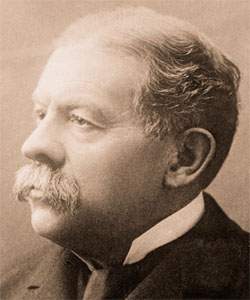Richard Olney (American National Biography)
Most notorious was his similar ultimatum to Great Britain demanding submission of the long-standing boundary dispute between British Guiana and Venezuela to arbitration by the United States. Charging that Britain's claim violated the Monroe Doctrine, he asserted that the "infinite resources" and "isolated position" of the United States rendered it "master of the situation and practically invulnerable as against any or all other powers." When the deadline for replying passed, Olney helped Cleveland draft a message to Congress, asking for authority to draw the proper boundary line and if necessary to use armed force to uphold it. Britain subsequently accepted arbitration, and the war fever precipitated by the message died down. Although his initiation of the crisis needlessly risked war, his subsequent handling of the affair contributed to a reasonable settlement.
Richard Olney (Appleton’s)
Richard Olney (Papers of the President)
Olney, Richard; lawyer; Attorney General and Secretary of State under President Cleveland; b. Sept. 15, 1835, in Oxford, Mass.; educated at Leicester Academy and graduated Brown University, 1856, and LL. B. Harvard Law School 1858; began practice in Boston and soon was looked upon as an authority on wills and estates; corporation lawyer; appointed by President Cleveland in 1893 Attorney General, and upon the death of Walter Q. Gresham in 1895 he was transferred to Secretary of State.
Richard Olney (New York Times)
RICHARD OLNEY DIES; VETERAN STATEMAN Attorney General and Secretary of State in Cleveland’s Second Term Expires in Boston at 81.
UPHELD MONROE DOCTRINE
His Demand Upon Great Britain Led to Her Arbitration of Venezuelan Boundary Dispute.
BOSTON, April 9.—Richard Olney, Attorney General and Secretary of State in Cleveland’s second Cabinet, died at his home here last night. He was in his eighty-second year and had been ill for several weeks, though it was not until yesterday that his condition became serious. With him when he died were Mrs. Olney and their daughter Mrs. George R. Minot of this city. Mrs. C.H. Abbot, their other daughter, is in Paris.
Although Richard Olney [ocupied] the office of Secretary of State for only one year and nine months, his name will go down in history as one of the greatest Secretaries that ever held the portfolio of the State Department. He will perhaps best be remembered for his handling of the question of the boundary dispute between Great Britain and Venezuela. His methods were those of a strong and well-equipped lawyer rather than of the politician, and he gained reputation in his office by his intellectual strength and sturdy purpose.
Disregarding the warning that a rigid maintenance of the Monroe Doctrine might plunge this country into war with Great Britain, President Cleveland and Secretary Olney successfully insisted upon the arbitration of the boundary dispute between the empire and Venezuela. The Secretary of State, in a famous message sent through Ambassador Bayard to Lord Salisbury, said:
“Great Britain both admits that there is a controversy and that arbitration should be resorted to for its adjustment. But while up to that point her attitude leaves nothing to be desired, its practical effect is completely nullified by her insistence that the submission shall cover but a part of the controversy; that as a condition of arbitrating her right to a part of the disputed territory the remainder shall be turned over to her. Upon that principle—except her feebleness as a nation—is Venezuela to be denied the right of having her claim heard and passed upon by an impartial tribunal? ‘It is so because I will have it so,’ seems to be the impartial justification Great Britain offers.”
At first Lord Salisbury refused to submit to the American demand, but is Government remained firm, and he receded and agreed to submit the entire question to arbitration.
His Settlement of Mora Claim.
Another act of Mr. Olney while Secretary of State was the settlement and collection from Spain of the Mora claim, in which many Administrations had been unsuccessful. He negotiated with Great Britain an arbitration treaty for the settlement of future disputes between the two countries. This, however, was afterward defeated by the United States Senate.
Mr. Olney was appointed Attorney General by President Cleveland in 1893, and he served two years and three months before he was called to the State Department to succeed Walter Q. Gresham as Secretary. It was Mr. Olney who, during the Debs railroad strike in Chicago, counseled the calling out of Federal troops. He defended that action successfully in an argument before the Supreme Court. He bent his energies upon asserting that the law of the United States was supreme throughout the entire country and that the interests of no section must be prejudicial by interference with the free use of the railroads in the carrying of the mails or with the enjoyment of interstate commerce.
He was not, however, hostile to labor unions, and this is shown by his letter to the United States Circuit Court in Philadelphia in 1804 in relation to a petition of the Brotherhood of Railroad Trainmen asking for relief against the receivers of the Philadelphia & Reading Railroad, who threatened to discharge all members of the brotherhood unless within a specified time they resigned from the organization. He upheld the right of labor to organize, and added: “No better mode for the settlement of contests between labor and capital has yet been devised or tried than arbitration.” In 1895 Mr. Olney, at the request of the Chairman of the Committee of Labor of the House of Representatives, examined into labor conditions, and he gave valuable suggestions, [indorsing] the principles of mediation and arbitration, and he drafted the bill dealing with labor matters that was passed by the House in February, 1895.



